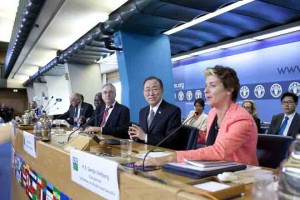Civil society and the private sector do not always agree on food security issues, but an October conference will see both sides come together to discuss food waste and sustainable fisheries
Five years ago, the Committee on World Food Security (CFS) went through a ground-breaking reform to ensure that the voices of all concerned stakeholders were heard in the food security and nutrition debate. Before the reform, only countries that took decisions on food security and nutrition issues were involved, but now all relevant constituencies are included in the decision-making process. These include civil society, the private sector, agricultural research bodies, international financial institutions and UN bodies. While this makes coming to an agreement more challenging, the result is more robust and realistic policy recommendations that already have wide buy in.
CFS is based in Rome, which, as the home of the three UN food agencies, is the epicentre for food and agriculture. The agencies operating out of Rome are the Food and Agricultural Organization (FAO), the International Fund for Agricultural Development (IFAD) and the World Food Programme (WFP). While CFS is part of FAO, the secretariat is made up of staff from the three agencies, which allows easy access to a wide range of expertise. CFS also has an independent High Level Panel of Experts on Food Security and Nutrition (HLPE) that provides scientific and knowledge-based analysis and advice.
At CFS 39 in 2012, a consensus was reached on policy recommendations on Food Security and Climate Change – the first time agreement has been reached on climate change at an international level. The 41st Session of CFS, scheduled to take place from 13-18 October in Rome, continues this trend with two topical policy round tables. The first is on Food Losses and Waste in the Context of Sustainable Food Systems, which will look at the whole food chain from producer to consumer. The second is The Role of Sustainable Fisheries and Aquaculture for Food Security and Nutrition. Both these topics are backed up by HLPE reports and will lead to sets of concrete and actionable policy recommendations.
The power of soft law
The decisions and policy recommendations of CFS are not legally binding, which makes some people ask what the value is of ‘soft law’. Food security and nutrition is a very complex area and in many cases legislation would not necessarily be effective. What is needed is a change in approach towards issues that impact food security and nutrition. When CFS policy recommendations and guidelines are endorsed, they already have wide buy-in because of the multi-stakeholder process, which gives them added value, and it is in the interest of many different constituencies to see them used.
The Voluntary Guidelines on the Responsible Governance of Tenure of Land, Fisheries and Forests in the Context of National Food Security (VGGT) is among the most important CFS documents. These guidelines were endorsed two years ago, but are already being used in many countries. Governments are promoting them and investors see them as a license to do business. Civil society is also promoting them because they protect the interests of citizens. This year CFS will be asked to endorse a set of Principles for Responsible Investment in Agriculture and Food Systems that will complement the guidelines on tenure.
As well these two papers, CFS policy recommendations cover a wide range of topics related to food security and nutrition. These include the role of biofuels, price volatility, social protection and the importance of gender. All of these promote good governance as the key to achieving food security and nutrition.
In May 2014 the UN Secretary General Ban Ki-moon visited Rome and met with CFS stakeholders, referring to CFS as one of the best untold stories of modern development.
Food security and nutrition is everyone’s business, and the CFS platform brings together positions and perspectives from all sectors in a co-ordinated process that is inclusive, international and intergovernmental. CFS promotes concrete actions that can make a major difference towards food security, nutrition and a sustainable future for us all.
For more information, visit the website at www.fao.org/cfs or email cfs@fao.org






